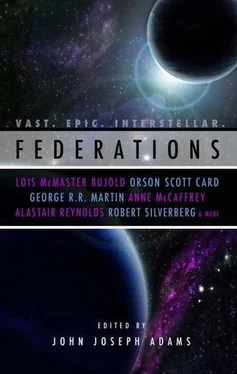Wren Hex-Yemenni woke early. They had to teach her everything from scratch, and there wasn’t time for her to learn anything new before she hit fifty and had to be expired.
“Watch it,” the other techs told me when I was starting out. “You don’t want a Hex on your hands.”
By then we were monitoring Wren Hepta-Yemenni. She fell into bed with Dorado ambassador 214, though I don’t know what he did to deserve it and she didn’t even seem sad when he expired. When they torched him she went over with the rest of the delegates, and they bowed or closed their eyes or pressed their tentacles to the floors of their glass cases, and afterwards they toasted him with champagne or liquid nitrogen.
Before we expired Hepta, later that year, she smiled at me. “Make sure Octa’s not ugly, okay? Just in case—for 215.”
Wren Octa-Yemenni hates him, so it’s not like it matters.
• • •
It’s worse early on. Octa and Dorado 215 stop short of declaring war—no warring country is allowed to meet the being from Carthage when it arrives, those are the rules—but it comes close. Every time she goes over to the Dorado ship she comes back madder. Once she got him halfway into an airlock before security arrived.
We reported it as a chem malfunction; I took the blame for improper embryonic processes (a lie—they were perfect), and the Dorado accepted the apology, no questions. Dorado 208 killed himself, way back; they know how mistakes can happen.
Octa spends nights in the tech room, scanning through footage of Hepta-Yemmeni and Dorado 214 like she’s looking for something, like she’s trying to remember what Hepta felt.
I don’t know why she tries. She can’t; none of them can. They don’t hold on to anything. That’s the whole point.
• • •
The astronomers at the Institute named the planet Carthage when they discovered it floating in the Oort cloud like a wheel of garbage. They thought it was already dead.
But the message came from there. It’s how they knew to look in the cloud to begin with; there was a message there, in every language, singing along the light like a phone call from home.
It was a message of peace, they say. It’s confidential; most people never get to hear it. I wouldn’t even believe it’s real except that all the planets heard it, and agreed—every last one of them threw a ship into the sky to meet the ship from Carthage when it came.
• • •
Every year they show us the video of Wren Alpha-Yemenni—the human, the original—taking the oath. Stretched out behind her are the ten thousand civilians who signed up to go into space and not come back, to cultivate a meeting they’d never see.
“I, Wren Alpha-Yemenni, delegate of Earth, do solemnly swear to speak wisely, feel deeply, and uphold the highest values of the human race as Earth greets the ambassador of Carthage.” At the end she smiles, and her eyes go bright with tears.
The speech goes on, but I just watch her face.
There’s something about Alpha that’s… more alive than the copies. They designated her with a letter just to keep track, but it suits her anyway—the Alpha, the leader, the strong first. Octa has a little of that, sometimes, but she’ll probably be expired by the time Carthage comes, and who knows if it will ever manifest again.
Octa would never be Alpha, anyway. There’s something in Alpha’s eyes that’s never been repeated—something bright and determined; excited; happy.
It makes sense, I guess. She’s the only one of the Yemennis who chose to go.
• • •
Everybody sent ships. Everybody. We’d never heard of half the planets that showed up. You wonder how amazing the message must be, to get them all up off their asses.
Dorado was in place right away (that whole planet is kiss-asses), which is why they were already on iteration 200 when we got there. Doradoan machines have to pop out a new one every twenty years. (My ancestors did better work on our machines; they generate a perfect Yemenni every fifty years on the dot—except for poor Hex. There’s always one dud.) Dorado spends their time trying to scrounge up faster tech or better blueprints, and we give our information away, because those were the rules in the message, but they just take—they haven’t given us anything since their dictionary.
WX-16 from Sextans-A sent their royal house: an expendable younger son and his wife and a collection of nobles, to keep the bloodline active until the messenger arrived. We don’t deal with them—they think it’s coarse to clone.
NGC 2808 (we can’t pronounce it, and sometimes it’s better not to try) came out of Canis Major and surprised everyone, since we didn’t even think there was life out there. They’ve only been around a few years; Hepta never met them. Their delegate is in stasis. Whenever that poor sucker wakes up he’s going to have some unimpressed ambassadors waiting to meet him. They should never have come with only one.
Xpelhi, who booked it all the way from Cygnus, keep to themselves; their atmosphere is too heavy for people with spines. They look like jellyfish, no mouths, and it took us a hundred and ten years to figure out their language; the dictionary they sent us was just an anatomical sketch. Hepta cracked it because of something Tetra-Yemenni had recorded about the webs of their veins shifting when they were upset. The Xpelhi think we’re a bunch of idiots for taking so long. Which is fine; I think they’re a bunch of mouthless creeps. It evens out.
Neptune sent a think-tank themselves, like they were a real planet and not an Earth colony. They’ve never said how they keep things going on that tiny ship, if it’s cloning or bio-reproduction or what; every generation they elect someone for the job, and I guess whenever Carthage shows up they’ll put forward the elected person and hope for the best. Brave bunch, Neptune. Better them than us.
Centauri was the smartest planet. They sent an AI. You know the AI isn’t sitting up nights worrying itself into early expiration. It’s not bothered by a damn thing.
• • •
Octa makes rounds to all the ships. She’s the only one of them who does it, and it works. Canis Major sent us help once, when we had the ventilation problem on the storage levels. She didn’t ask for help; they’re not obligated to share anything but information. But when she came back, an engineer was with her.
“Trust me, I know everything about refrigeration,” he said, and after the computer had translated the joke everybody laughed and shook his hand.
Octa stood beside him like a mother until they had taken him into the tunnels, and then she tucked her helmet under her arm like she was satisfied.
“They’re good people,” she said to the shuttle pilot, who was making a face. “With no ambassador to keep them going, they must feel so alone. Give them a chance to do good.”
“I’ve got the scan ready,” I said. (I scan her every time she comes back from somewhere else. It’s a precaution. You never know what’s going on outside your own ship.)
“Let’s be quick, then,” she said, already walking down the corridor. “I have to make some notes, and then I need to talk to Centauri.”
(Centauri’s AI is Octa’s favorite ship; she’s there far more often than she needs to be. “Easier to come to decisions when it’s just a matter of facts,” she said.)
Octa did a lot of planning, early on, like she had a special purpose beyond what Alpha had promised—like time was short.
Of all the copies, she was the only one who ever seemed to worry that her clock was ticking down.
• • •
All the Yemennis have been different, which is unavoidable. Even though each one has all the aggregated information of previous iterations without the emotional hangover, it can get messy, like Hepta and Dorado 214. Human error in every copy. It’s the reason her machines all have parameters instead of specs; some things you never can tell. (Poor Hex.)
Читать дальше












